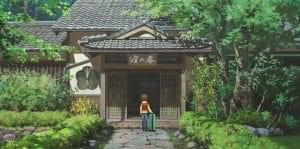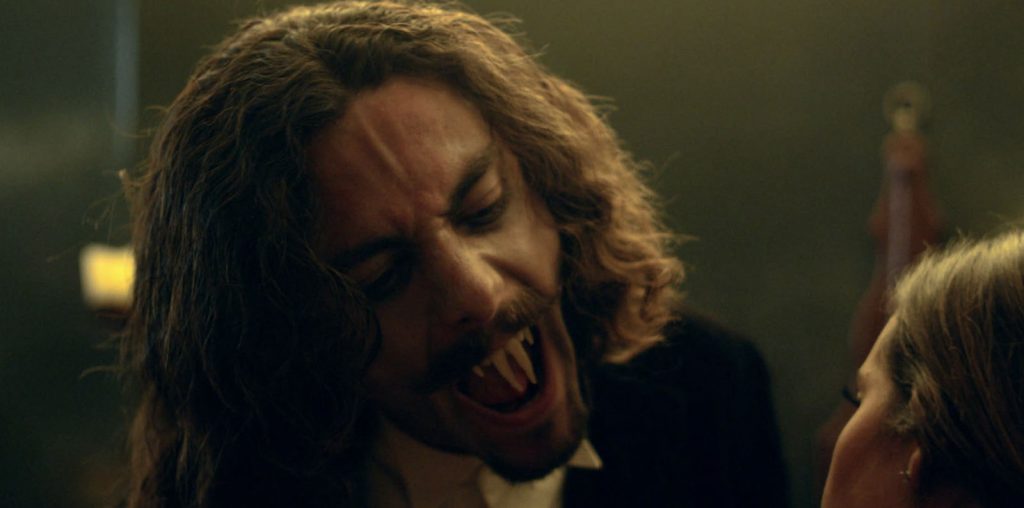
Most folks have heard of Studio Ghibli, the reigning king of Japanese animation. Not quite as many, however, are familiar with the wildly impressive plethora of anime output and its historical and cultural significance. While by no means a connoisseur, I have seen my share of relatively obscure – at least by your average Western standards – fare, from Satoshi’s Kon’s surreal oeuvre to an absolutely insane series titled Elfen Lied. Therefore, backed by an adequate understanding of the nuances and connotations of Japanese animation, I can assuredly state that Kitarô Kôsaka Okko’s Inn falls somewhere right in the middle of the spectrum: not quite profound or unique enough to truly standout, yet a perfectly functional example of its kind.
Okko’s Inn contains all the trademarks of your typical anime feature: reddening cheeks and massive eyes with pupils that twinkle / tear up to signify emotion; eccentric emphases on revelatory moments; and a saccharine score to emphasize themes. Its laudable messages may be spelled out in bold, and the few thrown-in adult themes may baffle its pre-teen target demographic (while not being quite enough to merit a more mature audience). What saves Kôsaka’s feature is its vibrant, detailed animation – a rain of flowers, a multi-hued Koinobori festival – and an affable, unpretentious spirit.
“…our young heroine befriends her savior, Uribo, a floating, lonely, nose-picking ghost of a young boy…”
At its heart, Okko’s Inn is about a girl who finds redemption in friendship after a terrible tragedy. In Okko’s case, the tragedy – which opens the film – happens to be a traumatic car crash, wherein she loses her parents. Saved by a hazy specter of a young boy, Okko goes to stay at her grandmother’s traditional inn, deep in the Japanese countryside. This is where our young heroine befriends her savior, Uribo, a floating, lonely, nose-picking ghost of a young boy, who seems equally surprised to meet her. Prompted by Uribo, Okko volunteers to help out at the inn – where “rejecting no one and healing everyone” is their motto – as the “junior innkeeper”.
As Okko trains for her duties at the inn, discovering her culinary talents in the process, she joins her new school and meets all sorts of characters, both real and dead. Among them: the Tolstoy-quoting, Victorian-era-clad Matsuki, nicknamed Frilly Pink, and a “bell demon” called Suzuki, who may be the most adorable of the ghostly bunch. Okko also encounters a variety of the inn’s visitors, including the Porsche-driving fortune-teller and self-proclaimed shopping freak Glory. Okko’s ghost friends help her with the chores and life lessons and, as she recovers and feels increasingly content in her new surroundings, they become more and more translucent, allowing her to move on with life.
The film’s languid pacing, with its notable lack of thrills and revelations, may be off-putting to jaded audiences, but its low-key, wholesome nature is refreshing in an era of bombastic, product-placement-infused, computer-animated entertainment. The film takes its time to tell a simple story, no frills. Where Okko’s Inn steps wrong is in its somewhat odd choices, such as its questionable promotion of consumerism as a means of escape. “It’s not a gift from a guest,” Glory says, having showered Okko with expensive gifts. “I want you to think of it as a present from your new grown-up friend.”
“What saves Kôsaka’s feature is its vibrant, detailed animation – a rain of flowers, a multi-hued Koinobori festival – and an affable, unpretentious spirit.”
Some dialogue exchanges get lost in translation. “That was a close save,” a character says. “I didn’t shave, I still have hair!” comes the gleeful response. Another example of a reoccurring, knee-slapping line: “Are you sure you’re a junior innkeeper and not a junior dim-keeper?”. Okko’s Inn’s themes of death and the importance of resilience, memories, teamwork and friendship aren’t enough to counterbalance the slew of slapstick jokes – a spider on someone’s head, a drawn-on moustache on an unaware fool – that are clearly intended for the wee ones. As a result, parents may end up asleep, while their kids switch Blu-rays to Frozen.
That said, Kitarô Kôsaka’s light-hearted and contagiously joyful film contains just enough beautiful imagery, positive messages of acceptance and touching moments to warrant a look. In other words, give Okko’s Inn a visit – but not before getting Spirited Away by a few classic anime standouts first.
Okko’s Inn (2019) Directed by Kitarô Kôsaka. Written by Reiko Yoshida. Dubbed version features voices of Madigan Kacmar, Colleen O’Shaughnessey, Alyson Leigh Rosenfeld, Kenneth Aikens. Original version features voices of Seiran Kobayashi, Nana Mizuki, Satsumi Matsuda, Etsuko Kozakura.
6 out of 10

